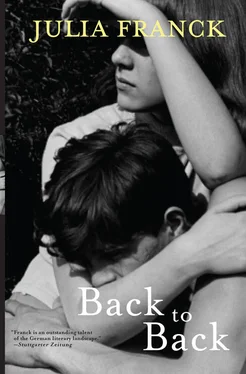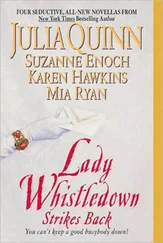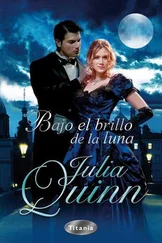Do you have a mirror in here? She didn’t want to have to cross the corridor to the bathroom without make-up on her face.
He said no, but went out and brought her the big mirror from the corridor wall. She crouched in front of it and put her make-up on. He asked if she would like some tea. They heard footsteps in the corridor. Thomas didn’t know if they belonged to Käthe, Ella, a visitor or a model. Anyone could be walking about the house at this time, in the middle of a Sunday.
Marie said she would rather go down to the lake, which must be quite close.
A wind was blowing, already a mild, spring wind; bare trees towered to the sky, broken branches lay in the mire as they walked hand in hand along the Fliess and over the marshy land. Among the puddles and small pools, you could see the first little green leaves, scillas and anemones peeping through the blackened winter foliage. They had to pick their way around large puddles, and mud clung to their shoes. On the narrow landing stage made of piled boulders, a fallen alder lay in the brown reeds, its root pointing up at the sky, as if the earth were yawning, and Thomas scrambled up on it and gave Marie a hand to help her up. He led her along the trunk by his hand, out over the water, which grew deeper and deeper, to where the little breaking ripples had buried the crown of the tree. They could go no farther. Swaying in the wind, they kept their balance, held hands and looked out over the restless grey water. It was fresh here, cooler than in the wood. They did not talk, but sometimes their eyes briefly met, and their hands did not let go of each other. The wind blew over the lake towards them, raising little waves so that water sprayed in their faces.
The caster, his journeyman and a potter from Weissensee were sitting with Käthe at the table on the veranda, munching the sorrel that Käthe, not expecting visitors, had sent Ella to pick in the meadow beside the Fliess, and that she was now serving as a salad with lemon, oil and finely chopped parsley. Ella brought glasses, a bottle of the Bulgarian wine of which, to Käthe’s annoyance, there had been only mellow varieties in the shops for months now, and a jug of tap water. The windows to the garden, where tulips and daffodils were in flower, were wide open.
As soon as Ella had handed round the glasses, Käthe told her for goodness’ sake to take the potatoes out of the oven or they would burn. Ella took the hot baking tray out with an oven glove and put it down in the middle of the table, on the tile with the painted picture of a naked woman. The halved potatoes, cut side down on the tray, were still audibly sizzling in the oil, and the aroma of the thyme that Ella had sprinkled over them rose in the air. The guests praised the sorrel salad, and Käthe beamed: What did I tell you? Käthe knows how to cook, no one leaves my table unsatisfied.
Ella filled the glasses with the ruby wine. The chair beside the caster’s journeyman, opposite Käthe and the potter, was still vacant. Ella sat down and put some salad on her plate. The caster’s journeyman had restless legs, and kept fidgeting about with them under the table. He had to sit with his legs wide apart. Ella wondered whether he was nudging her thigh with his knee by accident or on purpose. She concentrated on the sorrel. Across the table from her, she was aware of the potter’s eyes lingering on her hands, her fork, her mouth. She didn’t have to look up to know how his long, pale beard fell to his chest, how his curly, ash-grey hair came down to his shoulders. Nothing at all about the potter seemed to her attractive. How could she stop him looking at her? He had fallen into decline long ago. Nausea came over her. But Ella did like the caster’s strong shoulders, his deep voice, his large, firm hands. As usual the caster had eyes only for Käthe, and today there was something persistent in his voice.
Pour the water, Ella, Käthe said, interrupting the caster. She held her nearly empty wine glass out to Ella across the table. Ella picked up the water carafe and filled Käthe’s glass to the brim. The potter quickly finished his wine, put both hands round his glass, and waited meekly until Ella finally poured some for him as well, last of all. Water trickled into his pale beard.
The caster stuck to his theme, and was not to be distracted from it: If all the young men born between 1940 and 1943 are now being called up for military service, I suppose your Thomas is among them?
No, snapped Käthe. The caster’s choice of subject was unwelcome. She drank half her glass of water. He’s going to be a doctor now, he’s studying.
Studying medicine, is he? There was a silly note of awe in the potter’s question, and he asked it so quietly that Käthe didn’t hear him.
Käthe cleared her throat. Thomas is a few weeks too young, born in ’44, he’s only just had his eighteenth birthday. Käthe drained her glass in a single draught, relieved to have thought of such a simple explanation. She helped herself to potatoes before anyone else. Even before the others had plucked up courage to take themselves, she speared a crisp piece of potato on her fork and blew on it loudly. Luckily. It would have been silly of them to take the young men out of the industries now. Snorting, she bit into the hot potato. They’re needed, after all, those young men. Thomas has been on duty round the clock for the last week. Haven’t you heard? They can’t control the dysentery.
They have dysentery?
The whole city has dysentery. Käthe put another large piece of potato into her mouth all at once, and went on, chewing: In any case, they’re using all the emergency beds they can find. Thomas is working two or three shifts running all the time. I can’t think when they get any sleep. She stuffed a forkful of sorrel into her mouth, and a leaf soaked in oil fell on her blouse.
Doesn’t he want to do his national service? The caster wasn’t letting the subject drop; the armed forces were very important to him.
What are you talking about — what do you mean, national service? Käthe laughed out loud, and the oily little leaf on her mighty bosom heaved up and down. It won’t come to that. The Germans have done enough killing already. Käthe asked if anyone wanted more salad. Without waiting for an answer, she pulled the bowl towards her and picked out the last leaves with her fork.
The caster did not seem to like Käthe’s decided attitude. He turned to the potter. You say something, why don’t you?
Listen, said Käthe, before the potter could take his eyes off Ella and answer, just because they’ve thought up national service over there we don’t have to make the same stupid mistake.
The caster pushed his fork round his plate, and the potter tentatively shrugged his shoulders, looking at Ella as if she might help him out.
Oh, silly me! I’ve forgotten my napkin again. Shaking her head, Käthe removed the little leaf from her bosom and put it in her mouth. She rubbed her blouse with her finger, but the oily mark wouldn’t go away. Ella tried to get her legs into safety. The nudging of the assistant’s knee was making her nervous.
We have a little society in Weissensee, a drawing circle, sighed the potter. His squawking voice disgusted her. We’re looking for a young model to sit for nude studies, Ella. Do you have any spare time? Maybe we could even pay you something.
Go on, do it, Ella, said Käthe, before Ella could answer for herself.
Ella nodded. How often did anyone need her these days? Since she had left school, was only attending evening classes, and brought hardly any money home from the wardrobe mistress for whom she worked at the theatre, Ella had to do all she could to show Käthe how willing she was to work.
Suddenly Käthe looked back and forth in surprise at the potter and Ella, as if discovering something. Have you been painting your lips?
Читать дальше












